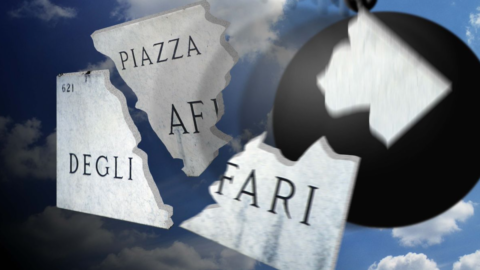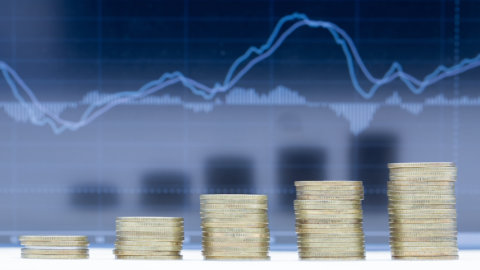What was feared is happening and the markets are reacting as expected: the world stock markets are shaking afterwards the Russian invasion of Ukrainian territories, commodity prices soar, since gas surging 30% approximately (to then resize in these hours), to oil that travels over one hundred dollars. Wheat and cereals are on the rise and safe-haven assets are snapped up: therefore gold, the dollar, the yen and the Swiss franc are strengthened. On the opposite side the ruble hits an all-time low. Prices of T-Bonds rise, while yields fall. However, the Italian secondary is also doing well, because the new scenario could influence the choices of central banks. In the meantime, the index of fear is rising, because we don't know where a war in the heart of Europe can reach. At the moment The US and the EU have decided to increase sanctions, but Russia lets it be known that it will answer "an eye for an eye a tooth for a tooth"
Bags to hell
The European lists close the worst session since April 2020, when risk aversion was justified by the spread of the pandemic and the consequent lockdowns. The most affected stocks are those of banks and automotive companies.
The start is heavy for Wall Street, waiting for Joe Biden to speak at 18,30 pm Italian time. The Nasdaq briefly attempts a rally, but then changes sign once more to settle around parity. On the other hand volatility is very high in this period. The Dow Jones loses about two percentage points.
The European lists are all in deep red: Piazza Affari together with Frankfurt is one of the worst, also given the two countries' dependence on Russian gas. The Ftse Mib loses 4,15% and falls back to 24.877 basis points; the Dax marks -3,98%. Paris -3,83%; Madrid -2,8%; Amsterdam -2,66%; London -3,86%.
Nothing compares to Moscow, which plummets by 33,28% with the index in rubles and 39,44% with the index in dollars. The ruble is sinking. The Ukrainian system goes haywire, as the Central Bank has decided to suspend the foreign exchange market, ban the transfer of money abroad and daily limits on cash withdrawals.
“Basically there is no scenario priced by the markets, because it is impossible to fully discount one – IG Markets analyst, Kyle Rodda told Bloomberg – it is the worst of the scenarios. Bad news is one thing. Another is bad news without knowing absolutely what it will lead to”.
Leonardo goes up to Milan
In Piazza Affari, despite the session to be forgotten, there are headlines such as Leonardo (+4,34%) which is appreciated on the day when Airbus and the Organization for Joint Armament Co-operation (Occar) signed the Eurodrone global contract, which includes the development and production of 20 systems and 5 years of support initial in service. The Italian defense group is also at the forefront of the project.
In strong progress Diasorin +2,47% and Amplifon +1,97%. Good for utilities such as Terna +1,13%. Campari +1,81% and Saipem +1,85% rebound.
The size of the losses is much higher and starts from Unicredit, -13,49%, despite the bank saying its exposure to Moscow has high coverage rates and the subsidiary's balance sheet is liquid and self-funded.
The lower part of the list is mostly occupied by financial stocks.
Pirelli shares also plunged -10,4%, even if the results presented yesterday are good and the prospects for 2022 are growing. The fact that the company generates 3% of revenues in Russia and has two plants, equal to a production capacity of 10%, weighs on the stock, as he writes the broker Intesa Sanpaolo (-7,96%).
Telecom loses 2,45%, although the go-ahead from the Antitrust to Fibercop offers the opportunity to regain some sprint. The company says it is very satisfied: "AGCM's decision - he underlines - in fact confirms the effectiveness of the project promoted by TIM which is accelerating the development of latest generation network infrastructures, to the benefit of the digitization of the entire country ..
Outside the main basket, among the securities exposed to Moscow, Maire Tecnimont suffers -7,86%. The gold and gas races on the other hand send Coonfinvest +21,03% and Gas Plus +26,17% flying.
What about central banks?
According to traders the Russian invasion of Ukraine will arise a brake on central banks and the Fed it will no longer raise rates by 50 basis points in March, but will limit it to 25 points. Radiocor writes it, quoting Cme FedWatch Tool and saying that the probability of this scenario is now 91%. Meanwhile, the ECB in a note from a spokesman states that Eurotower “is closely monitoring the implications of the situation in Ukraine. It will conduct a comprehensive assessment of the economic outlook at its March meeting. This includes recent developments in the geopolitical area”. As for the sanctions, these “are decided by the EU and by European governments. The Eurosystem will implement them”.
The spread falls, the euro suffers
The escape from equities leads investors to take refuge in bonds and not only in Treasuries or Bunds, also in the light of what could be the stock market corrections by central banks. Thus the spread between Italian and German ten-year bonds fell to 163 basis points (-3,99%), with a BTP rate at +1,8% and that of the Bund at +0,17%.
With the dollar index in full swing, the euro weakens, trading down by about 1,4% against the dollar, for an exchange rate around 1,14.
Oil flies, which travels well over $100. Brent rose by 7,6% to 104,27 dollars a barrel; Wti grows by 6,3% to 97,9 dollars.
Gold travels up by about 0,9% to 1924,67 dollars an ounce.





